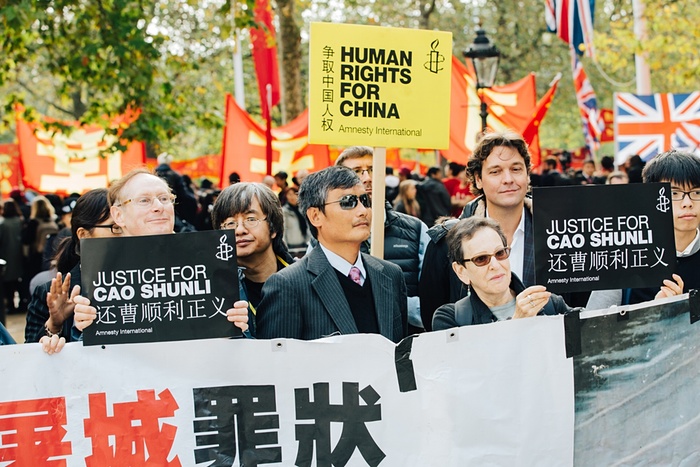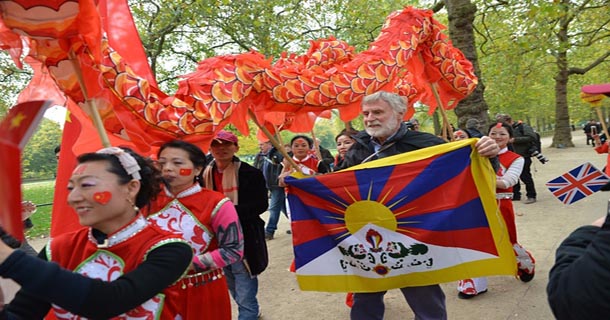Chinese President Xi Jingping’s recent four-day visit to the United Kingdom on October 19-23 reflects Britain’s precarious diplomatic balancing act. With a powerful economic relationship at stake, few British representatives were willing to raise human rights issues with President Xi lest it impact trade negotiations.
President Xi and his wife Peng Liyung were given a full diplomatic welcome upon their arrival in London. President Xi’s schedule was packed with engagements with the Royal family and Prime Minister David Cameron, an address of the British Parliament and attendance at a UK-China business summit.
The Chinese ambassador to the UK, Liu Xiaoming, stated that the visit heralds “a golden era for the relationship” between the two nations. Many UK investors, particularly within the infrastructure, energy and banking sectors, are intent on capitalising on Chinese contracts. As Asia’s largest economy, China is a heavyweight in trade negotiations, giving them considerable diplomatic leverage over the UK. In advance of the visit the UK government issued a press release announcing that the visit heralded more than £30 billion ($46 billion) worth of trade and investment deals, to create over 3,900 jobs across the UK.
Groups lobbying to highlight China’s poor human rights record and to get the issues raised officially were ignored. The UK’s Chinese ambassador Liu Xiaoming advised British diplomats to avoid sensitive issues such as Tibet, claiming that the President would feel offended if human rights were raised as a topic of discussion, saying “We don’t shy away from talking about human rights. What we are against is to use human rights to interfere with other countries’ internal affairs and to try to impose your own system on to others.”
Despite this warning, Fabian Hamilton MP, chair of the All Party Parliamentary Group for Tibet joined several Tibet and human rights groups in organising a “Stateless Lunch” to honour Tibetan, Uyghur and Chinese human rights defenders who have been imprisoned and intimidated by the Chinese government. Mr Hamilton said “I am honoured to host Tibetans, Uyghurs and Chinese individuals who will share stories of courage, highlighting the oppression in China today under Xi Jinping.” He continued, saying that it was a “statement of the concern of so many of us in Britain about this government’s approach to China, which is driven by commercial interests, with human rights being an irritating distraction to be ignored in public.”

Free Tibet and Amnesty International protesters admist the pro-China rally
Photo:Hugh Cunningham/Demotix/
Tibet support groups and human rights groups campaigned throughout the visit, taking to the streets outside the venues for Xi’s meetings and appearances with banners and slogans, sending him a clear message of dissatisfaction with his human rights policies. Protesters were outraged when three demonstrators were arrested under public order laws and their houses searched following their arrest. One of those arrested, Shao Jiang, a survivor of the Tiananmen Square massacre who lives in the UK, said he was shocked to be tackled by police after holding placards in front of Xi’s motorcade in London, and to learn his home had been searched and computers seized while he was in custody.“It feels like it was when I was in China,” Shao told the Guardian. “Then, every time I was arrested the Chinese police would search my rooms and take things. It reminded me of that.”
Shao’s wife told the Guardian “He was on his own, doing nothing apart from holding two A4 sheets of paper, one saying ‘end autocracy’ and the other saying ‘democracy now’. He was standing there peacefully when the police attacked him.”
Charles, the Prince of Wales, was absent from the State banquet in honour of President Xi in what was believed to be a show of solidarity with Tibet. The New York Times reported this as a snub for China while the UK Telegraph said that the prince has had a troubled relationship with China for decades, partly because of his support for Tibet and his friendship with the Dalai Lama. The prince did meet Xi on other occasions during the visit.
President Xi spent three days in London before flying to Manchester, where he visited the National Graphene Institute and the City Football Group. President Xi and his wife attended an event at Manchester Airport before flying out.





 Print
Print Email
Email